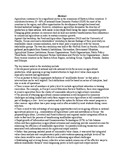| dc.description.abstract | Agriculture continues to be a significant sector in the economies of Eastern Africa countries. It
contributes between 20 –30% of national Gross Domestic Product (GDP) for most of the
countries in the region, and offers opportunities for development through backward and
forward industrial linkages. However, subsistence agriculture dominates the structure of production in these nations, with maize (a key staple food) being the major commodity grown. Changing global pressure on resources such as land necessitates transformation from subsistence to commercial agriculture in order to sustain economic growth.
Against this backdrop, the Food and Agriculture Organization (FAO) and the University of
Nairobi, Kenya convened a stakeholders’ workshop to discuss findings of their joint study on
smallholder maize commercialization, and to share policy experiences with the various
stakeholder groups. The two-day workshop was held at the NorFolk Hotel in Nairobi, Kenya and
gathered participants from Research Institutions, Universities, Government Ministries, Agricultural Finance Institutions, Farmer Organizations, Youth Organizations, Public Policy
ThinkTanks, Donors/Development Partner Institutions and Private Sector Organizations – drawn
from various countries in the Eastern Africa Region, including Kenya, Uganda, Rwanda, Zambia
and Ethiopia.
The key issues noted in the workshop include:
• Development policies at national and sub-national levels focus more on agricultural production, while ignoring or giving limited attention to high-level value chain aspects
especially markets and agribusiness
• It is important to find an appropriate definition of ‘smallholder farmer’ so that policy interventions can be well targeted. Such definitions could be based on nature of enterprise, land size or scale of operations
• There is some sort of resistance at policy level to include agricultural education in training curriculum. For example, in Kenya’s recent Education Review Taskforce, there were suggestions to remove agriculture from the cluster of examinable subjects in high school curriculum
• The process of attaining agricultural commercialization is still hampered by numerous challenges including limited and costly farm support services Agriculture is still considered to be part of drudgery, a low - level occupation and as the option for failures who cannot progress in other careers –agriculture has a poor image and is often avoided by most students during career selection
• There is need to take advantage of emerging opportunities such as on-going reforms in national agricultural policies (e.g., consolidation of Agricultural Laws and institutions in Kenya –the proposed Agriculture, Livestock and Food Authority) and regional market integration efforts in order to fast track the process of transforming smallholder agriculture
• Rapid growth of Information and Communication Technologies (ICTs) in Sub-Saharan
Africa and their application in agricultural extension and marketing provide renewed avenues for enhancing the efficiency of smallholder agriculture –by possibly lowering transaction costs associated with information search for inputs and output markets
• Rather than pursuing isolated points of commodity value chains, it was noted that integrated value-chain analysis and complementary policy interventions spanning multiple levels of the value chain would be more cost-effective in addressing agricultural challenges
• Establishing and reviving farmer collective action models remain one of the effective ways to address smallholder farmers’ weak bargaining power in both input and output markets
• Making agriculture more attractive e.g., by use of drama and songs to convey extension
messages, and by promoting fast moving service-oriented agribusiness enterprises would
be a better way of retaining the rural youth in agriculture. Also consider regional and cultural differences in youth attitudes and aspirations. Further, encourage participation by professionals in agricultural activities in order to give agriculture a positive image that would attract the youth
• It is important to strengthen research-extension-farmer linkages to enhance design of locally-relevant farm technologies
• Context-specific training of farmers is necessary in order to promote sustainable
transformation from subsistence to commercial agriculture.
• Promote non-cash options of solving youth problems e.g., cash for education interventions. | en_US |


